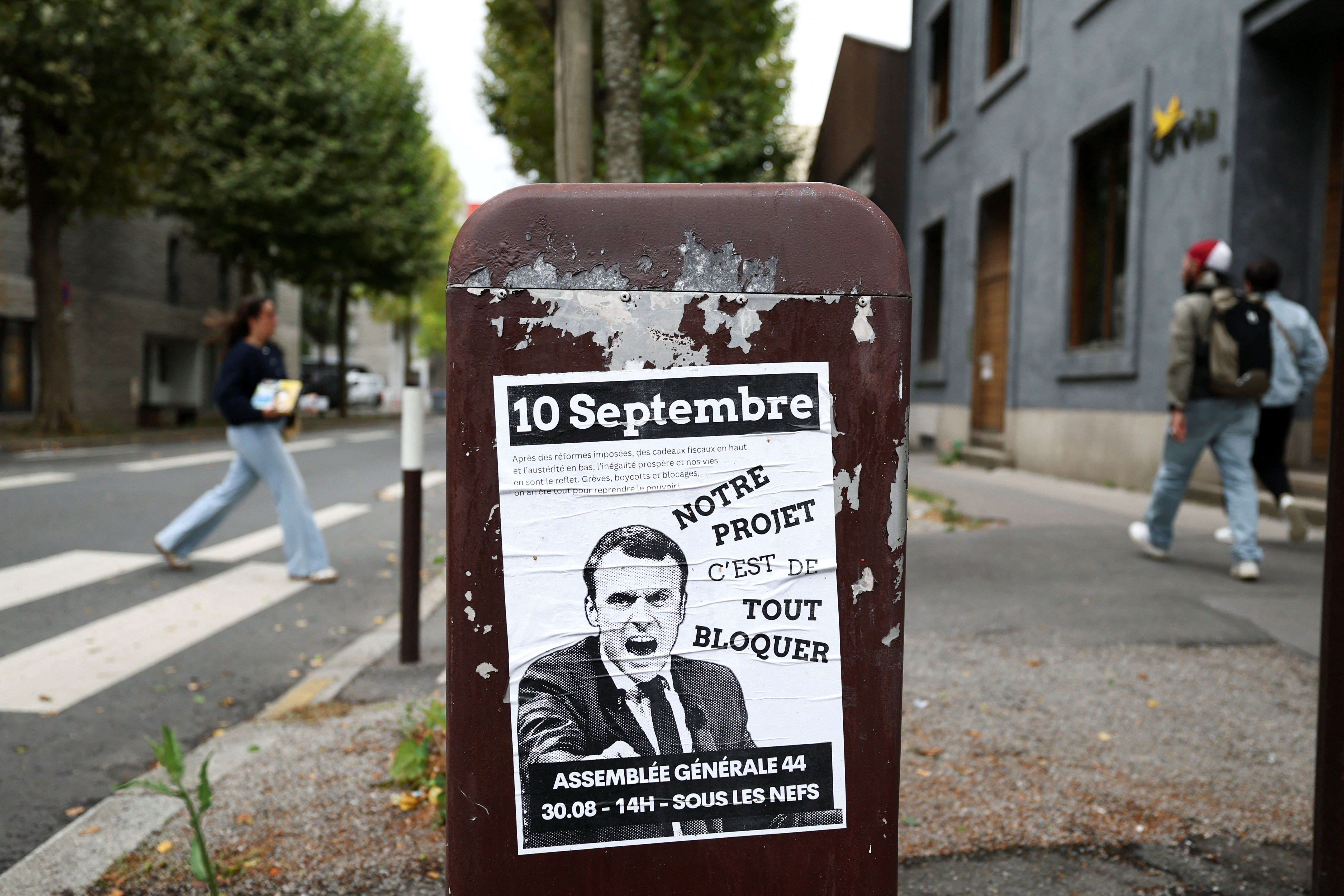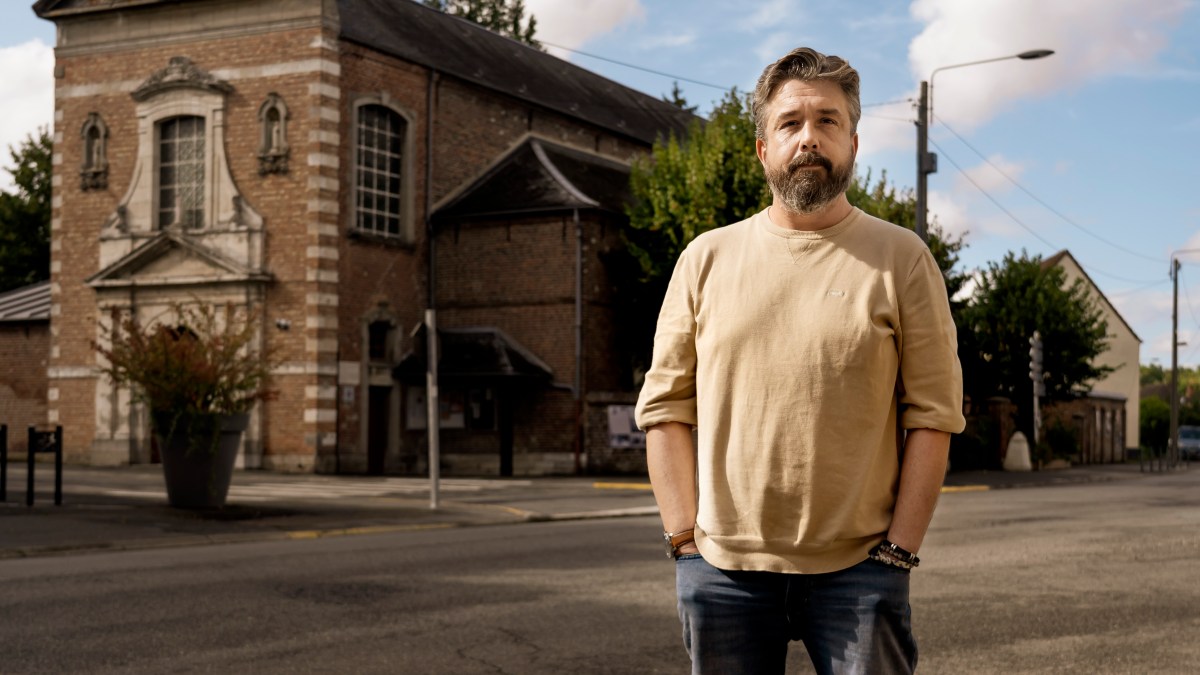Like many of his compatriots, Julien Marissiaux, a website designer from northern France, has had enough: of rising prices and taxes, worsening public services and, above all, what he sees as a self-serving political class topped by President Emmanuel Macron that has lost touch with the people.
“The whole system is rotten to the core,” he told me last week as we sat in the co-operative café he set up eight years ago in an abandoned building in Morbecque, a town of 2,500 people near the Belgian border. “The overwhelming majority of the French people do not feel they are being represented any more.”
Rather than just grumble, Marissiaux, 43, is determined to do something to change the system — or at least to have a try. The loquacious father of two is among the instigators of a day of action that aims to bring France to a halt on Wednesday, involving everything from strikes and protests to consumer boycotts, named Bloquons Tout (Let’s block everything).

Marissiaux is inspired by Coluche, the late comedian turned social activist
ERIC DE MILDT – COMMISSIONED BY THE TIMES
“Our strategy is to create a hydra, a multi-headed hydra, so you can’t simply cut off its head,” Marissiaux said, explaining the lack of a single leader of the movement, which is named Les Essentiels (the Essentials).
Their inspiration is Coluche, the late comedian turned social activist, whose red clown’s nose may become the symbol of the movement — just as the gilets jaunes (yellow vests) gave their name to the last big social upheaval to shake up France in 2018 during the early part of Macron’s first term.

Coluche, whose real name was Michel Colucci, became an inspiration for the movement
JAMES ANDANSON/SYGMA/GETTY IMAGES
The action, planned for countless towns and cities across France, is unlikely to provide comic relief for the president, however. It comes in a week expected to begin with the ousting of François Bayrou — the fourth prime minister since the start of 2024 — with both the left and the far right planning to join forces to defeat the 74-year-old in a parliamentary vote.
The immediate cause of Bayrou’s woes is economic: more specifically, resistance to his plans for €44 billion in spending cuts to rein in the public finances after more than half a century in which the French state has consistently failed to balance the books.
“For months France has been discovering the situation that I have been highlighting for years: that it is drowning in debt,” the prime minister declared last week in one of a series of radio and television interviews intended to hammer home his message.

“Our project is to block everything,” reads a poster in Saint-Sebastien-sur-Loire, near Nantes
STEPHANE MAHE/REUTERS
More fundamental, however, is an underlying national malaise that can seem inexplicable to outsiders but which has undoubtedly gathered pace under Macron, especially during the upheavals of the Covid lockdowns and subsequent inflation, followed by the geopolitical uncertainty of war in Ukraine and the return of President Trump. Call it the “French Paradox”.
For the more than 100 million people or so who visit France each year — more than any other place on the planet — the country has long been synonymous with glorious weather and scenery, good food and wine, and the best high-speed rail network in Europe.
Long vying with the UK to be the sixth-largest economy in the world, it is also known for its dominance of the global fashion industry, network of nuclear power stations and prowess in cars and aeronautics. Macron’s attempts to turn France into “la start-up nation’’, though widely mocked by critics, have also borne some fruit, helping to encourage banks and other companies to Paris from London.
Many of the French themselves appear to see their country differently, however, with a traditional national grumpiness giving way to what one recent poll described as “a collective depression”.

Bloquons Tout graffiti along the Garonne river in Bordeaux
CHRISTOPHE ARCHAMBAULT/AFP/GETTY IMAGES
About 66 per cent of the people questioned by the pollsters Viavoice believe their country is in decline, especially its healthcare and education systems and its welfare state — all of which were once the envy of its neighbours. And that was even before the current bout of political turbulence.
“To understand this collective depression, it is difficult to refer solely to an accumulation of individual difficulties, or to the economic and social constraints weighing on France,” the study’s authors concluded. It could be better explained instead by a “feeling of lost identity”.
A perceived decline in law and order, fuelled by the spread and growing power of drug gangs way beyond their traditional heartland in suburbs of Paris and Marseilles, is the major preoccupation of the French, ahead of inflation, according to another survey, by Ipsos.
Such national gloom explains the rapid spread of the discontent expressed by those behind the protests planned for Wednesday, largely on TikTok, Facebook and other social media platforms, many of them from Paris and other big cities in what has been dubbed la France périphérique.
• Why is youth violence exploding in fragile French cities?
Marissiaux had already been formulating ideas among people he sat with in his café, which is modelled on the cafés philosophiques, informal places of discussion that became fashionable in France during the 1990s. “The kind of place where we try to see the glass as half full and not half empty and try to achieve a dynamic that is different from what we see around us,” he said.
The decisive moment, Marissiaux explained, came on July 14, the French national day, when he came across a short audio clip posted on TikTok entitled “Open letter to the people of France” in which an anonymous male voice urged people “to pull the emergency brake” to bring the country to a standstill on September 10.

A protester mans the barricades in Paris in 2019. Anti-government protests have taken place throughout the Macron years
ABDULMONAM EASSA/AFP/GETTY IMAGES
Recognising a fellow spirit, Marissiaux got in touch with the clip’s originator, who turned out to be a struggling 46-year-old small businesswoman named Christelle, from the Var region, more than 600 miles to the south, whose surname has not been made public. The voice was generated by AI, she revealed: she feared if people heard a woman speaking, they would scroll past.
Together they hammered out a programme whose revolutionary if inchoate demands include a slashing of the income and power of the country’s elites and an end to political parties and their replacement by a form of direct democracy based on local referendums. They also want a “Frexit” from the European Union.
Coluche is a fitting symbol: an embodiment of revolt and solidarity, he launched a satirical bid to contest the 1981 presidential election, only to pull out under pressure from François Mitterrand, the socialist who eventually won.
Coluche went on to establish a network of food kitchens for the poor. His death five years later in a motorcycle crash aged just 46 continues to fuel conspiracy theories. Marissiaux is among those who doubt it was an accident.
Their movement got a boost on July 15, when Bayrou announced his programme of spending cuts, which sparked particular outrage by calling for the abolition of two of France’s 11 annual public holidays. “I don’t watch TV, I didn’t even know he was going to announce his budget the next day,” Christelle told a French magazine that tracked her down.

Several groups are planning to join the protests on September 10
STEPHANE MAHE/REUTERS
She and Marissiaux aim to achieve their goals not by taking to the streets but rather by locking themselves down at home, drawing out large amounts of cash and boycotting debit cards and supermarkets in favour of small shops. “September 10 is just the first day,” he said.
Others that have jumped on their bandwagon have a more traditional vision of how to proceed. The planned actions of another nebulous group, Indignons-Nous (Let’s get outraged), include blocking railway stations, refineries and major roads and occupying roundabouts — which will be more visible and more immediately disruptive. Marissiaux and his allies will not be joining them.
Jean-Luc Mélenchon, leader of the far-left France Unbowed party, has publicly supported calls for a general blockade and a general strike on that day.
At the other end of the political spectrum, Marine Le Pen’s National Rally, which sees itself as the party of law and order, is steering clear — even though some of its leading figures have expressed sympathy for those who could be hit by Bayrou’s spending cuts.
Whether those behind the various actions will succeed in “stopping” France on Wednesday is not clear. A leaked document by the intelligence services has warned of violence and sabotage, though Bayrou has dismissed the predicted turnout of 100,000 as “fairly low for French society”.
Memories of the gilets jaunes movement remain fresh, however, on both sides of the French barricades. It, too, began on social media, as a grassroots protest against a planned hike in the tax on diesel, but quickly grew into a broader societal revolt that caused major disruption from November 2018 until well into the following spring — and only petered out after concessions by the government that cost several billion pounds.

A gilet jaune protester at the Arc de Triomphe in 2019
KIRAN RIDLEY/GETTY IMAGES
Who will actually be running France by then is also not clear. Barring a surprise last-minute deal with his opponents, Bayrou looks set to be defeated in Monday’s vote.
Macron could then potentially dissolve parliament, though this would likely be a last resort. He is instead thought to be considering asking the Socialists, under Olivier Faure, 57, to attempt to form a government, which might scrape together a narrow majority with the help of Macron’s own centrist Renaissance party and some of the centre-right Republicans.
But they too will be confronted with the same grim economic reality as Bayrou — and by the need to tackle the public finances.
At 5.8 per cent of GDP, France’s budget deficit is the third biggest in the EU, while the country’s accumulated debt is surpassed only by that of Greece and Italy — pushing up its borrowing costs on the international markets. Government spending already accounts for 57 per cent of GDP — compared with 44.2 per cent in the UK — making further tax rises difficult.
Despite likely attempts to raise the burden on the corporate sector and the rich, a left-leaning prime minister will find, like Bayrou, that some spending cuts at least will be unavoidable.
France’s collective depression, it seems, may not be as paradoxical as it appears.
